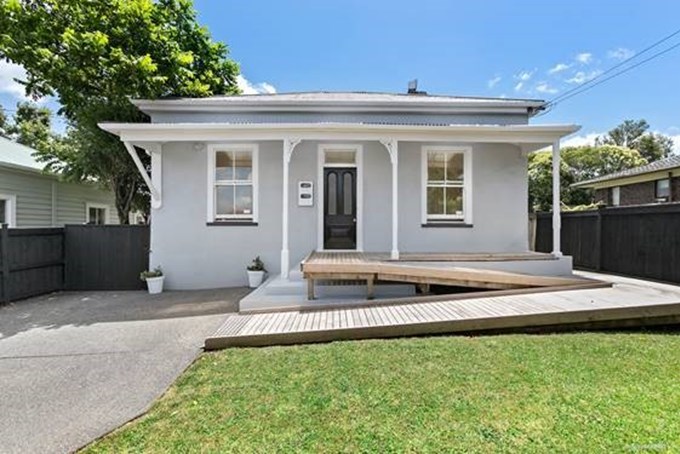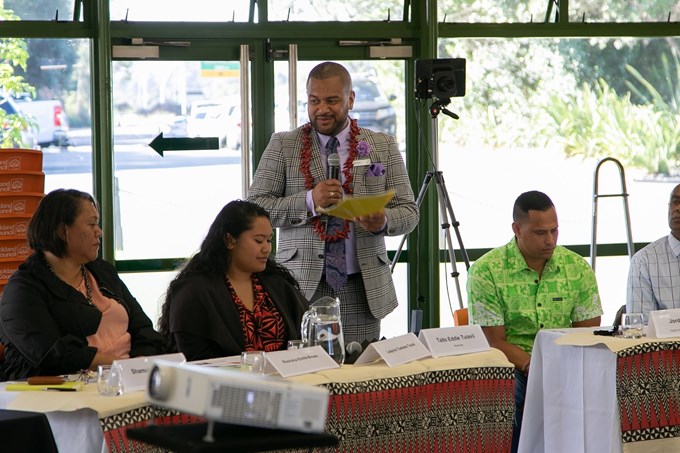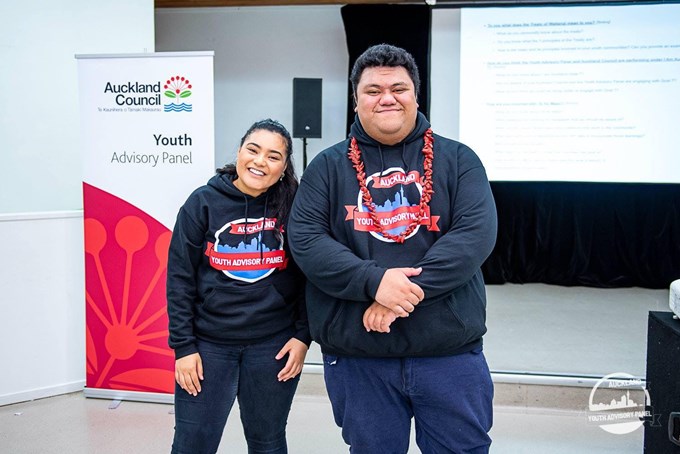Auckland Council’s six demographic advisory panels celebrated the end of their three-year term this month.
The panels prepared end of term reports summarising the outstanding work undertaken since their terms began in 2016.
These reports were presented to the Environment and Community Committee with Councillor Alf Filipaina, deputy-chair of the committee and liaison councillor for the Ethnic Peoples and Pacific Peoples Advisory Panels, applauding the dedication and meaningful work of the panels over the past three years.
“Our advisory panels have provided significant input to decision making during their term," says Councillor Filipaina.
"They’ve hosted community forums, advocated for policy change, provided feedback on strategies and plans and, perhaps most importantly, they continue to help us better connect with diverse communities throughout Tāmaki Makaurau.”
Disability Advisory Panel
The panel has been monitoring the implementation of the Disability Operational Action Plan which was initiated by the 2013-2016 panel.
Auckland Council staff reported genuine progress in some areas and the panel was pleased to see progress in areas like improved access to public swimming pools and beaches, especially for wheelchair users. The panel is actively involved in providing advice on the next iteration of the Disability Operational Action Plan which is being coordinated by the Diversity and Inclusion team.
Ongoing concern that a significant lack of accessible housing remains a key issue for disabled people prompted the advisory panel to select 'accessible housing' as the theme for the May meeting of the Community Development and Safety Committee which the panel co-hosted.

Snapshot highlight – central government and legislation
In April 2019 two representatives from the panel and council staff met with Ministers Twyford, Sepuloni and Salesa to discuss how accessible housing might best be implemented in legislation and regulations by the government.
The Minister for Disability Issues, Hon Carmel Sepuloni, invited panel members to meet with her in July 2019. The panel felt that the Minister demonstrated a real understanding of the size of the problem of New Zealand’s accessible housing stock, with just two per cent of New Zealand private dwellings being accessible. The Minister spoke with members of the panel about the steps the government is taking to increase the stock of accessible houses.
Read the full end of term report from the Disability Advisory Panel here.
Ethnic Peoples Advisory Panel
The panel provided advice and input to the council on matters of significance to ethnic communities including transport, housing, community safety, council by-laws and electoral participation. The panel’s community meetings were very well attended, and the panel used these meetings as one way to seek community engagement. The panel’s agreed set of six priorities provided focus for their work programme, however feedback highlighted transport and housing as the two most important and pressing issues for ethnic communities.
Stressing the changing demographics of Auckland, the panel selected the theme ‘An inclusive future for Auckland’ as their theme when they co-hosted the June meeting of the Community Development and Safety Committee.
Snapshot highlight – building community connections
Following extensive work and commitment, the panel’s new website went live in 2019. The intention of the website is to provide a legacy for future panels to continue building community connections and understanding. The panel used their website to share ethnic community stories called The Future of Auckland. These community stories aim to engage with the hopes and dreams of Auckland’s ethnic communities as ethnic diversity is projected to rise significantly over the next 20 years.
Read the full end of term report from the Ethnic Peoples Advisory Panel here.
Pacific Peoples Advisory Panel
The panel focused its efforts on council priorities, major initiatives of the Auckland Plan and systemic issues of importance to Pacific communities. The panel has also continued to provide strategic advice and support for council events and activities for Pacific communities, including Auckland’s annual Pasifika Festival.
The panel co-hosted April’s Community Development and Safety Committee meeting, requesting a live debate as the focus of the committee meeting. The debate ‘Auckland- is it the best place for Pasifika to live?’ was a lively and interesting way to discuss issues of importance to the panel’s communities including housing, civic participation and belonging.

Snapshot highlight -strategic advice
The panel offered advice on various bylaws including the Health and Hygiene Bylaw. One of the bylaws dealt with tattooing, with the panel using the issue as an opportunity to build relationships with local boards in the south. In conjunction with the Māngere-Ōtāhuhu and Ōtara-Papatoetoe local boards, the panel hosted a Health and Hygiene Bylaw fono in Manukau. The purpose of the fono was to share the scope of the bylaw and the potential impacts of traditional tattooing and get the community’s feedback on the proposed amendments.
Read the full end of term report from the Pacific Peoples Advisory Panel here.
Rainbow Communities Advisory Panel
The Rainbow Communities advisory panel identified safety, housing, transport, visibility and promotion of Auckland and activation of spaces, events and venues as key themes and aspirations for Auckland Rainbow Communities. The panel used these themes to help frame work programmes and priorities for their three-year term. The panel’s meetings with the council’s Governing Body and Executive Leadership Team focused on transport and housing issues.
The panel chose the theme of ‘belonging and participation’ when they co-hosted the August meeting of the Community Development and Safety Committee at Auckland’s RainbowYOUTH offices.

Snapshot highlight – engagement
The panel commissioned engagement research on Rainbow Communities’ priorities for Tāmaki Makaurau and also advocated for Rainbow demographic questions to be used in the council’s research. The panel also encouraged the council to include ‘gender diverse’ as a gender category in surveys and consultation.
Read the full end of term report from the Rainbow Communities Advisory Panel here.
Seniors Advisory Panel
A key goal of the panel was to progress actions to join the World Health Organisation’s Global Network. In 2018, the council’s Environment and Community Committee resolved to join the World Health Organisation Global Network of Age-friendly Cities and Communities.
The purpose of the global network is to foster information sharing between cities worldwide so that communities become more age-friendly. Membership of the age-friendly global network requires a commitment to a continuous improvement process for creating age-friendly environments with the expectation that an age-friendly city is more inclusive and beneficial for everyone, regardless of their age.
The Seniors Advisory Panel was the first meeting co-hosted with the Community Development and Safety Committee. The theme for this meeting, chosen by the panel, was ‘A Smart Age-friendly Auckland.’
Snapshot highlight – community engagement
In 2018 the panel held a community engagement forum, entitled Focus on the Future. This forum, attended by over 90 seniors representing more than 50 organisations from across the region, assisted the panel formulate their feedback on the Auckland Plan update and the Long-Term Plan.
Feedback from the forum showed that while housing and transport were predominant concerns, social isolation and investment in services, facilities, and solutions which enable fairness and equity, social participation and inclusion were also dominant. The message from the forum clearly articulated that the focus should be as much on sustaining the well-being of our city’s residents, as on infrastructure.
Read the full end of term report from the Seniors Advisory Panel here.
Youth Advisory Panel
The panel comprised 21 members ranging in age from 14 to 24 years and representing each of Auckland’s local board areas. The panel identified youth homelessness, the environment and sustainability, transport and accessibility and civic participation and youth engagement as priorities for their term.
In July, the panel co-hosted the Community Development and Safety Committee meeting and selected the theme of ‘transport accessibility, affordability and safety’ from a youth perspective.

Snapshot highlight - civic participation and youth engagement
Recognising the lack of youth voice in decision making, the panel supported the kaupapa of the council’s Elections team by undertaking engagement activities at universities and being involved in a series of online elections videos aiming to educate and encourage youth participation in this year’s local elections.
Read the full end of term report from the Youth Advisory Panel here.
Review of the 2016-2019 demographic advisory panels
Auckland Council’s Democracy Services commissioned a review of the 2016-2019 demographic advisory panels in late 2018. Read the full report here.
If you are interested in being informed about future opportunities to get involved with the council’s demographic advisory panels, please email us at advisorypanels@aucklandcouncil.govt.nz
Reflecting on their experience of being involved in the advisory panels are Veisinia Maka, former chair of the Youth Advisory Panel, John Kingi former co-chair of the Rainbow Communities Advisory Panel and Caroline Ligi Harris, former deputy chair of the Pacific Peoples Advisory Panel.
Veisinia Maka
John Kingi
Caroline Ligi Harris

